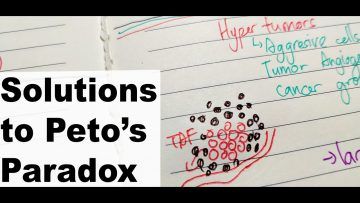John Nagy in Integrative and Comparative Biology:
 Larger organisms have more potentially carcinogenic cells, tend to live longer and require more ontogenic cell divisions. Therefore, intuitively one might expect cancer incidence to scale with body size. Evidence from mammals, however, suggests that the cancer risk does not correlate with body size. This observation defines “Peto’s paradox.”
Larger organisms have more potentially carcinogenic cells, tend to live longer and require more ontogenic cell divisions. Therefore, intuitively one might expect cancer incidence to scale with body size. Evidence from mammals, however, suggests that the cancer risk does not correlate with body size. This observation defines “Peto’s paradox.”
Here, we propose a novel hypothesis to resolve Peto’s paradox. We suggest that malignant tumors are disadvantaged in larger hosts. In particular, we hypothesize that natural selection acting on competing phenotypes among the cancer cell population will tend to favor aggressive “cheaters” that then grow as a tumor on their parent tumor, creating a hypertumor that damages or destroys the original neoplasm. In larger organisms, tumors need more time to reach lethal size, so hypertumors have more time to evolve. So, in large organisms, cancer may be more common and less lethal. We illustrate this hypothesis in silico using a previously published hypertumor model. Results from the model predict that malignant neoplasms in larger organisms should be disproportionately necrotic, aggressive, and vascularized than deadly tumors in small mammals.
More here.
